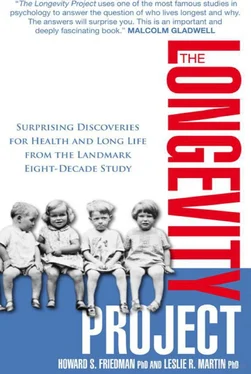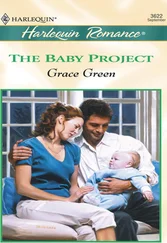Dr. Joan S. Tuckercompleted her Ph.D. at the University of California, Riverside, in 1993 and is currently a senior behavioral scientist at the Rand Corporation in Santa Monica, California. She is one of the world’s leading authorities on social relations, behavior, and health. Joan’s particular focus in our Terman studies has been the marital stability and social networks of the participants, although she has played a vital role in many aspects of the project.
Dr. Carol Tomlinson-Keasey, in discussions with Howard Friedman starting in 1989, helped hatch the idea of a “short project” (six months or a year was the original plan) to look at personality and longevity in the Terman sample. Carol was a collaborator on many of the early studies conducted in our laboratory. In 1999 she became the founding chancellor for the University of California, Merced, the tenth campus in the UC system. She died in 2009.
Dr. Joseph E. Schwartzis a professor in the Department of Psychiatry and Behavioral Science at the Stony Brook University Medical Center and at the Columbia University Medical Center. Well-known in the field of advanced methodology of health research, Joe spearheaded our first study of childhood sociodemographic predictors of mortality risk and, as our team’s initial biostatistician, played a major role in guiding our analytic strategies. Joe was Howard Friedman’s roommate in graduate school.
Dr. Michael H. Criquicollaborated for many years as our team’s physician-epidemiologist and is a professor and division chief of Family and Preventive Medicine at the University of California, San Diego’s School of Medicine. An award-winning researcher in the epidemiology and prevention of cardiovascular disease, one of Mike’s roles on this project has been supervising the nosologist’s coding of all the Terman participants’ death certificates. As a collaborator from the beginning, he played a crucial part in guiding our thinking on health behaviors and causes of death.
Dr. Richard A. Lippais well-known for his studies on gender-related individual differences (masculinity/femininity) and various personality, cognitive, and social dimensions. He is currently a professor of psychology at the California State University in Fullerton. Richard created the gender diagnosticity measures and collaborated with us as we uncovered the health risks associated with masculinity among the Terman participants.
Dr. Michael E. McCulloughis a well-known expert on religion, forgiveness, and gratitude, currently at the University of Miami. Mike had the idea to examine the development and change in religious involvement among the Terman participants and then combine that information with our studies of their personalities, social ties, and longevity. He and his colleague Dr. Craig Enders brought their substantial expertise in the area of statistical modeling to bear on our study of the Terman participants’ religious involvement over time.
Dr. Glen H. Elder, Jr.,is a research professor of sociology and psychology at the University of North Carolina at Chapel Hill and an influential intellectual leader specializing in development over the life course. He was especially interested in the later-life outcomes of Terman participants who were part of the World War II effort and, along with his research team (Dr. James Scott Brown and the late Dr. Elizabeth Clipp), collaborated on our study on this topic.
Dr. Daniel R. Seldincompleted his Ph.D. at the University of California, Riverside in 1999, and contributed especially to our analyses related to sexual activity and to careers. He now works in program evaluation.
Dr. Kathleen M. Clarkcompleted her Ph.D. at the University of California, Riverside in 2000, and was a key researcher during the middle years of our twenty-year project, contributing to numerous studies. She is now a research director at a major health care company.
Dr. Keiko A. Tagacompleted her Ph.D. at the University of California, Riverside in 2006, and contributed significantly to our studies of bereavement and social support.
Dr. Margaret L. (Peggy) Kernin 2010 completed her Ph.D. at the University of California, Riverside. Peggy is a core collaborator on many important aspects of the research, including especially the physical activity studies, the work on early education, the work on career success, and the studies of healthy aging.
Dr. Chandra A. Reynoldsis a psychology professor at the University of California, Riverside, and a leading expert on longitudinal statistical analyses and life-span developmental psychology. Chandra innovated and helped implement many of the data analyses involving change over time, as well as collaborating in important ways on studies of physical activity, careers, and partner effects.
Loryana Vieis a graduate student at the University of California, Riverside, who worked especially on the studies of marital happiness and health.
Other important collaborators include: Dr. Deborah L. Wingard, professor of Family and Preventive Medicine at the University of California, San Diego, an expert on epidemiology and women’s health, who was a key contributor to a number of studies during the first five years of our project; Dr. Catherine M. Tsai, who worked on our study of playing with pets and longevity and then headed off to medical school; Dr. Sharon Edelstein, a biostatistician who helped with many of the initial life-span longevity analyses; Dr. Charlotte N. Markey, who completed her Ph.D. at the University of California, Riverside, and worked on several of our studies of life-span health; Dr. Renee Goodwin, an epidemiologist at Columbia University, who worked on the study of conscientiousness and chronic disease; Dr. Christopher Petersonof the University of Michigan and Dr. Martin E. P. Seligmanof the University of Pennsylvania, who collaborated on our study of catastrophizing and are among the founders of the field of positive psychology; and Gloria Luong, who had the rare distinction of coauthoring a major scientific paper while still an undergraduate and who is now a graduate student in psychology.
In addition to our own research, we relied, of course, on the efforts of the late Dr. Lewis Terman and his many associates and successors. They are far too numerous to identify, but we would especially like to note the efforts of Mrs. Eleanor Walker, formerly of Stanford University, who assisted us with many of our initial forays into the original archives, and the many scholars associated with Dr. Terman or his project, especially including Melita Oden, Dr. Robert R. Sears, Dr. Al Hastorf, and Dr. Ed Shneidman.
Accidents, as cause of death
Acute myocardial infarction
Adherence effect
Age, lying about
Agreeableness
Alcohol use
Allen, Woody
Altruism
Alzheimer’s disease
Ambition
American Civil War
Animal companionship
Anxiety
Armstrong, Neil
Artistic occupations
Aspirin
Atomic Energy Commission
Average life expectancy
B vitamins
Bacterial infections
Bad luck
Ball, Lucille
Bereavement, effects of
Birth weight
Black bile
Blood pressure
Bodily humors
Body mass index (BMI)
Book of Exodus
Booth-Kewley, Stephanie
Boston Marathon
Bradbury, Lois Pratt
Bradbury, Norris
Breast-feeding
Brown, Scott
Burns, George
Cancer
Carbohydrates
Читать дальше











